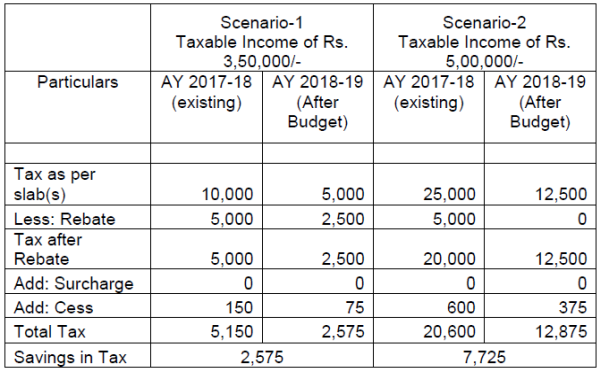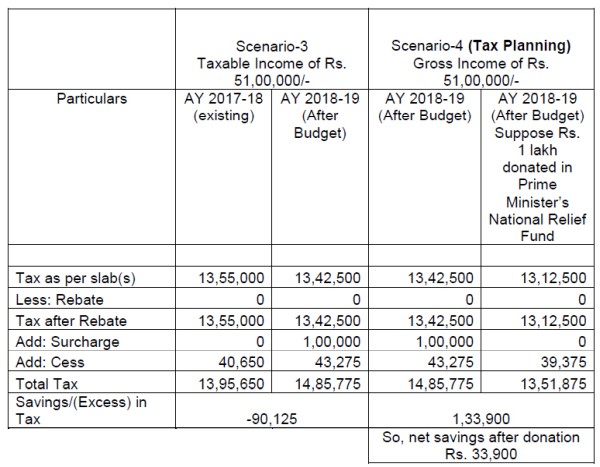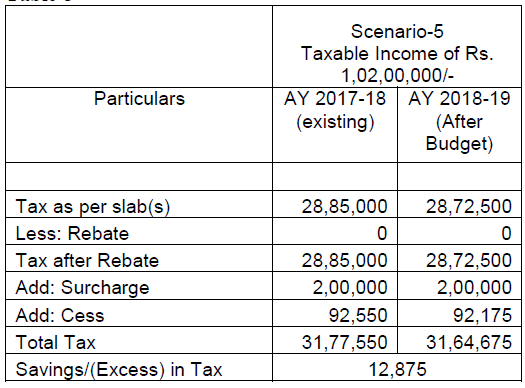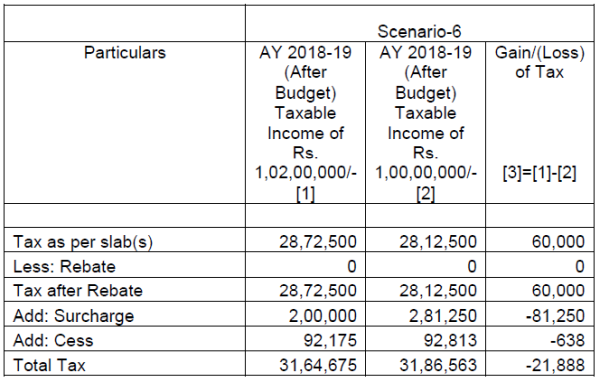1. Income Tax slabs are not changed, but the tax rate for first taxable slab of income from Rs. 2,50,001/Rs. 3,00,001 to Rs. 5,00,000 is decreased from 10% to 5%. So, now there will be directly a slab of 20% after the slab of 5% tax. As in the case of very senior citizens (every individual, being a resident in India, who is of the age of eighty years or more at anytime during the previous year), tax rate is NIL till income of Rs. 5,00,000, so above mentioned change will not affect to them. [Applicable from A. Y. 2018-19]
2. Surcharge in case of individual, H.U.F., A.O.P., B.O.I. and artificial juridical persons will be in two phases as under.
| 1 | Taxable Income | Surcharge on Tax |
| 2 |
More than Rs. 50 Lakhs but not exceeding Rs. 1 Crore |
10% |
| 3 |
More than Rs. 1 Crore |
15% |
[Applicable from A. Y. 2018-19]
3. Rebate under section 87A is decreased from (up to) Rs. 5,000/- to (up to) Rs. 2500/-. Further, this rebate will be available to individual resident in India whose taxable income does not exceed Rs. 3,50,000. [Applicable from A. Y. 2018-19].
4. Aggregating the effects of point no. 1, 2 and 3 given above, tax is calculated under different scenarios in tables given below.
Table-1

Table-2 (Tax planning)

Comment: In Table-2 (Scenario-3), you can observe that surcharge of Rs. 1 lakh (even after marginal relief) is payable after budget when someone earns Rs. 1 lakh in excess of 50 lakhs. Here one can make tax planning by contributing that amount of Rs. 1 lakh to say Prime Minister’s National Relief Fund by which taxable income will get down to Rs. 50 lakhs and surcharge of Rs. 1 lakh (plus 3% Cess thereon) can be saved and further saving of tax @ 30% (plus 3% Cess thereon) on the amount of that 1 lakh.
Table-3

Table-4 (Surcharge related controversy)

Comment: In Table-4 (Scenario-6), you can observe that person whose income is Rs. 1 crore will have to pay more tax of Rs. 21,888/- as compared to the tax on income of Rs. 1.02 crore. This is against the canon of equity which says “The subjects of every state ought to contribute towards the support of the Government, as nearly as possible, in proportion to their respective abilities, that is, in proportion to their revenue which they respectively enjoy under the protection of the State”. So, it is suggested to finance ministry to add the para given below as point (c) at the end of Paragraph A to Part III to The First Schedule to The Finance Bill, 2017.
"(c) Notwithstanding anything contained in preceding para (b), minimum surcharge payable, in case of taxable income exceeding Rs. 1 crore, will be determined as per following formula.
Surcharge = amount of taxable income * 2,81,250 / 1 crore".
By inserting the above provision, it can be assured that proportion of surcharge payable on income of Rs. 1 crore will be applied to those whose income is in excess of Rs. 1 crore (even when he/she gets marginal relief regarding surcharge).
5. Rate of income tax for domestic companies, where its total turnover or the gross receipt in the previous year 2015-16 does not exceed Rs. 50 crores is reduced from 30% to 25% for A.Y. 2018-19. It was 29% for A.Y. 2017-18, where its total turnover or the gross receipt in the previous year 2014-15 did not exceed Rs. 5 crores.
6. Tax on dividend of more types of assesses as well change in section 234C: Already in previous budget, tax on dividend income was levied @10% in case of individual, Hindu undivided family or a firm, resident in India where dividends in aggregate exceeds Rs. 10 lakhs during the year. With a view to ensure horizontal equity among all categories of tax payers deriving income from dividend, it is proposed to amend section 115BBDA so as to provide that the provisions of said section shall be applicable to all resident assessees except domestic company and a fund or institution or trust or any university or other educational institution or any hospital or other medical institution referred to in sub-clause (iv) or sub-clause (v) or sub-clause (vi) or sub-clause (via) of clause (23C) of section 10 and a trust or institution registered under section 12AA. [Applicable from A. Y. 2018-19]
It is hence proposed to provide in section 234C that that if shortfall in payment of advance tax is on account of under-estimation or failure in estimation of income of the nature referred to in section 115BBDA, the interest under section 234C shall not be levied subject to fulfillment of conditions specified therein. [Applicable from A. Y. 2017-18]
7. TDS once in a year on Rent - a separate section for individual or a Hindu undivided family to whom second proviso to section 194-I is not applicable: it is proposed to insert a new section 194-IB in the Act to provide that Individuals or a HUF (other than those covered under 44AB of the Act), responsible for paying to a resident any income by way of rent exceeding Rs. 50,000 for a month or part of month during the previous year, shall deduct an amount equal to 5% of such income as income-tax thereon.
It is further proposed that tax shall be deducted on such income at the time of credit of rent, for the last month of the previous year or the last month of tenancy if the property is vacated during the year, as the case may be, to the account of the payee or at the time of payment thereof in cash or by issue of a cheque or draft or by any other mode, whichever is earlier.
In order to reduce the compliance burden, it is further proposed that the deductor shall not be required to obtain tax deduction account number (TAN) as per section 203A of the Act. It is also proposed that the deductor shall be liable to deduct tax only once in a previous year.
It is also proposed to provide that where the tax is required to be deducted as per the provisions of section 206AA, such deduction shall not exceed the amount of rent payable for the last month of the previous year or the last month of the tenancy, as the case may be. [Applicable from 01/06/2017]
8. Period of holding is reduced in case of capital gains: With a view to promote the real-estate sector and to make it more attractive for investment, it is proposed to amend section 2 (42A) of the Act so as to reduce the period of holding from existing 36 months to 24 months in case of immovable property, being land or building or both, to qualify as long term capital asset. [In a country, where many people don�t have own home for residence, such incentive was not required to be given at all to investors in this sector.] [Applicable from A. Y. 2018-19]
9. Relaxations in provisions of Section 80-IBA: Section 80-IBA was introduced in Budget 2016 so as to promote the development of affordable housing sector. In this Budget, some conditions laid down by that section are relaxed as under.
1. The size of residential unit shall be measured by taking into account the "carpet area" as defined in Real Estate (Regulation and Development) Act, 2016 and not the "built-up area".
2. The restriction of 30 square meters on the size of residential units shall not apply to the place located within a distance of 25 kms from the municipal limits of the Chennai, Delhi, Kolkata or Mumbai.
3. The condition of period of completion of project for claiming deduction under this section shall be increased from existing 3 years to 5 years.
[Applicable from A. Y. 2018-19]
10. Provisions laid down for joint development transactions: New sub-section (5A) in proposed to be inserted in section 45 whereby it is proposed that Notwithstanding anything contained in sub-section (1), where the capital gain arises to an assessee, being an individual or a Hindu undivided family, from the transfer of a capital asset, being land or building or both, under a specified agreement, the capital gains shall be chargeable to income-tax as income of the previous year in which the certificate of completion for the whole or part of the project is issued by the competent authority; and for the purposes of section 48, the stamp duty value, on the date of issue of the said certificate, of his share, being land or building or both in the project, as increased by the consideration received in cash, if any, shall be deemed to be the full value of the consideration received or accruing as a result of the transfer of the capital asset:
Provided that the provisions of this sub-section shall not apply where the assessee transfers his share in the project on or before the date of issue of said certificate of completion, and the capital gains shall be deemed to be the income of the previous year in which such transfer takes place and the provisions of this Act, other than the provisions of this sub-section, shall apply for the purpose of determination of full value of consideration received or accruing as a result of such transfer.
"Competent authority" means the authority empowered to approve the building plan by or under any law for the time being in force;
"Specified agreement" means a registered agreement in which a person owning land or building or both, agrees to allow another person to develop a real estate project on such land or building or both, in consideration of a share, being land or building or both in such project, whether with or without payment of part of the consideration in cash;
It is also proposed to make consequential amendment in section 49 so as to provide that the cost of acquisition of the share in the project being land or building or both, in the hands of the land owner shall be the amount which is deemed as full value of consideration under the said proposed provision.
New section 194-IC is proposed to be inserted whereby - Notwithstanding anything contained in section 194-IA, any person responsible for paying to a resident any sum by way of consideration, not being consideration in kind, under the agreement referred to in sub-section (5A) of section 45, shall at the time of credit of such sum to the account of the payee or at the time of payment thereof in cash or by issue of a cheque or draft or by any other mode, whichever is earlier, deduct an amount equal to 10% of such sum as income-tax thereon. [Applicable from A. Y. 2018-19]
To read the full article: Click Here











 CAclubindia
CAclubindia
